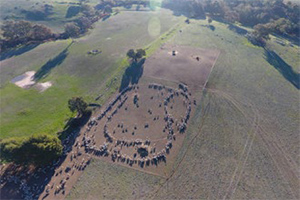Sustainability
- Home
- Locations
- What you can do
- LiFE Framework
- Sustainable Development Goals
- About us
- Grants
- Events
- Contact us
Now searching for:

An overhead photo of sheep being fed on the ground in a confinement feeding area.
The Southern NSW Drought Resilience Adoption and Innovation Hub, hosted by Charles Sturt University, is leading a project that will improve drought resilience through management of soils and available water. The project is led by Riverine Plains, in partnership with FarmLink, NSWDPI, Southern Growers and CSIRO and demonstrates practices from three farming system strategies that improve drought resilience. These non-conventional strategies include diverse legume rotations (to increase organic carbon, nitrogen and other soil elements), early-sowing of slower-maturing crops (to increase water holding capacity) and measuring residual nitrogen (to prevent excess application, increasing profitability and decreasing runoff into waterways).
The project involves 12 demonstration sites which will hold one field day per year to showcase the demonstrated practices, reaching a network of around 3,300 farmers. Outcomes will be communicated using 12 case studies and a range of communication channels.
Find out more about
Southern NSW Drought Hub